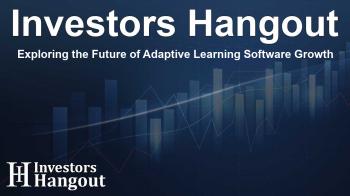Exploring the Future of Adaptive Learning Software Growth

Exploring the Future of Adaptive Learning Software Growth
Recent research indicates that the global adaptive learning software market is primed for remarkable expansion. Projections estimate that revenue will surge from US$ 2,063.1 million to an impressive US$ 10,887.0 million, indicating a compound annual growth rate (CAGR) of 20.3%. This growth highlights a transformation in how education is delivered, particularly as the demand for personalized learning experiences escalates.
The Rise of Personalized Learning
The emphasis on personalized education is more relevant than ever. As traditional learning environments shift towards remote and hybrid models, adaptive learning software plays a critical role. This innovative technology allows students to establish their learning pathways, accommodating different learning speeds and styles.
Creating Accessible Learning Environments
Adaptive learning software offers the flexibility that students need to progress in their studies independently. Whether learning from home or within a classroom setting, the software provides structured learning options tailored to individual needs, making education more accessible and inclusive.
Impact on Student Engagement and Performance
Research by influential organizations illustrates the significant positive effects of adaptive learning platforms. For instance, Knewton reported a 23% increase in learning outcomes among students using their adaptive platform. Similarly, DreamBox Learning noted a correlation between engagement with their software and improved math proficiency, indicating a 59% enhancement in skills among users who engaged for at least 60 minutes per week.
Fostering Academic Success
The data supports the notion that adaptive learning not only enhances academic performance but also builds confidence in students. As more educational institutions recognize the benefits these technologies provide, we can anticipate a shift towards personalized learning becoming the standard in modern education.
Corporate Integration of Adaptive Learning Tools
In the corporate world, large enterprises dominate the adaptive learning software market, holding more than 75% of the revenue share. The ability of large companies to invest in advanced learning tools stems from their substantial resources, enabling them to implement comprehensive training programs that resonate with their diverse workforce.
Enhancing Employee Development
For companies, the integration of adaptive learning software presents an opportunity to analyze employee performance continuously. Using data analytics to monitor progression allows organizations to tailor training programs precisely to individual needs, addressing skill gaps effectively and promoting a culture of continuous improvement.
The Growing Demand in Education and Beyond
The corporate sector is not the only area experiencing growth in adaptive learning software demand; homeschooling trends have shown a notable increase as well. Families are increasingly seeking tools that provide additional instruction outside of traditional schooling methods. This paradigm shift is encouraging private tutors to adopt adaptive technologies to enhance educational experiences.
Benefits for Private Tutors
As new educational resources emerge, private tutors leveraging adaptive learning solutions will be essential in offering personalized instruction that aligns with each student's unique learning style. Such tailored approaches enhance the effectiveness of tutoring services and empower students to reach their academic potential.
Market Segmentation and Key Players
As this well-defined market expands, several key players are setting the stage for innovation and adaptation. Companies like MCGRAW-HILL, PEARSON, and WILEY are at the forefront of driving this advancement, alongside emerging platforms such as DreamBox Learning and Fulcrum Labs.
Understanding the Market Dynamics
The segmentation of the adaptive learning software market reveals rich opportunities across various sectors, including educational institutions and corporate environments. The growth trajectory indicates an ongoing shift in how learning tools are utilized, benefiting students and employees alike.
Frequently Asked Questions
What is the projected growth of the adaptive learning software market?
The adaptive learning software market is projected to grow from US$ 2,063.1 million to US$ 10,887.0 million by 2032.
How does adaptive learning software benefit students?
It enables personalized learning experiences, allowing students to learn at their own pace and improve academic outcomes.
Are corporations using adaptive learning software?
Yes, large enterprises significantly invest in adaptive learning software to enhance employee training and development.
What impact does adaptive learning have on student performance?
Adaptive learning has been shown to increase student engagement and performance, with notable improvements reported in learning outcomes.
Who are the major players in the adaptive learning software market?
Major players include MCGRAW-HILL, PEARSON, and DreamBox Learning, among others.
About The Author
Contact Thomas Cooper privately here. Or send an email with ATTN: Thomas Cooper as the subject to contact@investorshangout.com.
About Investors Hangout
Investors Hangout is a leading online stock forum for financial discussion and learning, offering a wide range of free tools and resources. It draws in traders of all levels, who exchange market knowledge, investigate trading tactics, and keep an eye on industry developments in real time. Featuring financial articles, stock message boards, quotes, charts, company profiles, and live news updates. Through cooperative learning and a wealth of informational resources, it helps users from novices creating their first portfolios to experts honing their techniques. Join Investors Hangout today: https://investorshangout.com/
The content of this article is based on factual, publicly available information and does not represent legal, financial, or investment advice. Investors Hangout does not offer financial advice, and the author is not a licensed financial advisor. Consult a qualified advisor before making any financial or investment decisions based on this article. This article should not be considered advice to purchase, sell, or hold any securities or other investments. If any of the material provided here is inaccurate, please contact us for corrections.

